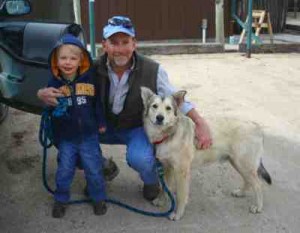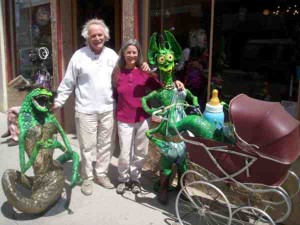Review by Eduardo Rey Brummel
Rural Life – June 2008 – Colorado Central Magazine
Trespass: Living at the edge of the promised land.
By Amy Irvine.
Published in 2008, by North Point Press
ISBN: 978-0-86547-703-2
THIS IS A MEMOIR ABOUT, among many things, finding a place of belonging and home. Irvine is a sixth-generation Utahn. After thirty-four years of living in Salt Lake City, and the suicide of her father, she moved to Monticello, in Utah’s San Juan County.
“There, I would grind down preconceptions, abandon past notions, and finally see things reassemble themselves.”
Along with Herb, her soon-to-be husband, Irvine prepared to become part of the Monticello community. Yet the stability she sought in belonging to either Herb or Monticello refused to come simply and easily.
As an environmental lawyer, Herb was constantly in the office or on the road. He was rarely home for more than a day at a time, and left building projects strewn unfinished outside their cabin. He had once playfully painted Irvine’s naked body with river mud. Now, the promised days and weekends of wilderness downtime with her were supplanted by excuses to see and record the damage wreaked by ORVs and jeeps.
In the Monticello social web, entry was gained by multi-generational family ties to the area, along with active LDS participation. Being a recent transplant to town, and a worshiper in temples of wilderness, rather than of mined marble, Irvine’s odds were stacked against her. But, for the sake of flying safely under the radar, she coyly played the part expected of her, keeping her boat-rocking beliefs and practices behind a bitten tongue.
That is, until an encounter with a cowboy in the Monticello Laundromat broke her. The fa¸ade had become too much to continue carrying, she realized, “I live a double life, and how miserable and dishonest that duality is.”
Near the end of the book, she says, “I still hardly know what will ultimately save my marriage, or the desert wilds. I only know what fails, and that I haven’t given up on either.”
This book offers a clear accounting of a woman going through a tough transition. In holding herself accountable for her actions, especially the bad and fracturing ones, Irvine writes with stinging integrity. She reveals the surprisingly fiber of her character in leaving her Utah of six generations to move with Herb to Norwood, Colorado. Or perhaps it’s not surprising, for she says of Herb, “He is a brave man to extend everything beyond his power so I could put our life, skeletons and all, into words. Not once did he flinch. And for that I will love him forever.”
Trespass is broadly woven from threads more abundant than a single review can cover. Irvine shows a depth of research regarding the earlier inhabitants of the Colorado Plateau, beginning with the hunter-gatherers, then onward to today’s Paiute, Navajo, and Ute. Likewise, she covers LDS history, the changing status of its women, and its on-going battles against federal mandates regarding the environment. She even invites Paul Shepard for frequent visits.
This wasn’t the book I expected. It grabbed hold of me more strongly, and affected me more deeply, than I was prepared for. So deep and wide is Irvine’s writing, that I couldn’t do the reading of it justice without re-reading it several times. I can no more let it be than it has let me be.
Be fortunate enough to read it and find yourself in the same situation.
Eduardo Rey Brummel may possibly be a sixth-generation Texan, but is working on being a first-generation Coloradan.


